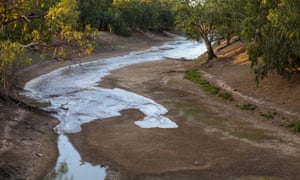A crucial law that would have legalised floodplain harvesting in New South Wales while the government devises a comprehensive licensing scheme has been disallowed, leaving the status of the practice in limbo.
In a rare defeat for the NSW government, Labor, the Greens, independents, Shooters, Fishers and Farmers, the Animal Justice party and One Nation joined forces in the upper house last night to defeat the regulation, which would have allowed “passive take” of floodwaters.
The practice of harvesting these floodwaters using levees, dams and pumps has deeply divided the NSW farming community. Cotton growers in the north said the law was necessary to clarify the legality of the practice, which has been occurring for years.
Farmers in the lower Darling and in the southern basin along the Murray say the rapidly expanding infrastructure and unregulated taking of water is responsible for historically low flows into the river system and has made the entire basin unsustainable.
The regulation, introduced in February this year, exempted floodplain harvesting in the state’s north-west from the requirements to hold a water access licence or to have approvals for works collecting and storing that water.
“The current situation is totally unacceptable. Dams are full in the northern basin while the Darling River has stopped flowing again and the southern irrigators are left with reduced allocations. Clearly something is broken with the system,” Field said.
“This rule risked locking in an unsustainable level of take from the northern basin for the future.
“If we don’t get this right, the NSW government risks handing out billions of dollars worth of unsustainable floodplain harvesting licences that future generations will be forced to buy back to save our rivers. Premier Berejiklian can’t afford another costly environmental disaster from the NSW National party.”
But the minister for water, Melinda Pavey, accused the Shooters of partnering with Labor and the Greens to “ensure that politics triumphs over sensible regulation of floodplain harvesting in NSW”.
“We have the Shooters member for Murray at the throat of the member for Barwon’s community, desperate to strip what water they have left off them,” Pavey said.
She said the regulation, alongside the Floodplain Harvesting Policy, would have provided a clear framework that outlines the government’s intent for floodplain harvesting licensing for water users and for the water regulator, the Natural Resources Access Regulator (NRAR).
“It provides clear, enforceable rules that apply until licensing is in place which will reduce – not increase – the capability to harvest floodplain water in the northern basin,” Pavey said.
The NSW Irrigators Council, which represents primarily the large irrigators in the north, said disallowance didn’t make floodplain harvesting illegal, it just leaves it under old-fashioned legislation passed in 1912, 50 years before the first cotton crop was picked in NSW.
Its chief executive, Claire Miller, said the floodplain harvesting exemption regulation was a step towards implementing the NSW floodplains policy to license and meter approved floodplain harvesting by July 2021.
“This regulation is just a step toward finally licensing and better metering floodplain harvesting – how could that be a bad thing?” Miller said.
“We want full licensing and metering for floodplain harvesting as soon as possible. This regulation is a step on the way – 1 July 2021 can’t come fast enough to put an end to the confusion.”
But the Southern Riverina Irrigators, which has split from the main irrigation lobby group, said the regulation would have “all but gifted northern NSW irrigators a bottomless well of untraceable water”.
Its chair, Chris Brooks, said: “It is not just a win for irrigators in the southern Riverina but for everyone across the southern basin; from farmers and floodplain graziers, the environment and Indigenous community through to business.”
The issue of floodplain harvesting has been festering, amid fears that inflows in the top of the Murray-Darling system have been reduced substantially, compared to historical averages. In part it may be due to climate change as longer droughts cause greater drying of the landscape and less water reaches the rivers. But farmers in the south have pointed to the huge growth in on-farm storages for water and other infrastructure such as levees to direct flows onto farms. These have been built without approvals.
The issue came to a head when the recent drought broke in February. The NSW government initially put an embargo on taking flood waters and pumping from the river to ensure a flow event right along the system. But under pressure from irrigators in the the north, the department lifted the embargo midway through on the grounds it was preventing damage to this infrastructure.
Pavey has said only 30GL were taken during the four days, but downstream farmers say the Darling has already stopped flowing again.


